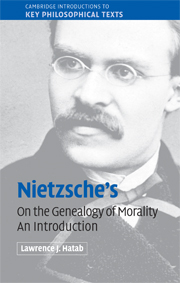Book contents
5 - The third essay
Published online by Cambridge University Press: 05 June 2012
Summary
The third essay offers an answer to the question whence the ascetic ideal, the priests' ideal, derives its tremendous power even though it is the harmful ideal par excellence, a will to the end, an ideal of decadence. Answer: not, as people may believe, because God is at work behind the priests but faut de mieux [lacking something better] – because it was the only ideal so far, “For man would rather will nothingness than not will.” – Above all, a counterideal was lacking – until Zarathustra.
(EH III, GM)Before beginning the tour of this essay, it is necessary to establish something about the first section in relation to a remark in the book's Preface, Section 8. There Nietzsche calls the Third Essay an example of what he means by “the art of interpretation (Auslegung).” The essay, he says, “is a commentary (Commentar) on the aphorism that precedes it.” It had almost always been assumed that the aphorism in question is the epigraph drawn from Thus Spoke Zarathustra (Z I, 7) that precedes Section 1: “Carefree, mocking, violent – this is how wisdom wants us: she is a woman, all she ever loves is a warrior.” In recent years, however, John Wilcox, Maudemarie Clark, and Christopher Janaway have shown conclusively that the aphorism in question is actually Section 1.
- Type
- Chapter
- Information
- Nietzsche's 'On the Genealogy of Morality'An Introduction, pp. 113 - 171Publisher: Cambridge University PressPrint publication year: 2008



